This study investigated types of academic motivation, self-control and self-regulated learning strategies of elementary school students. Firstly, we examined whether there exist multiple latent classes/groups based on motivational, control, and self-r...
http://chineseinput.net/에서 pinyin(병음)방식으로 중국어를 변환할 수 있습니다.
변환된 중국어를 복사하여 사용하시면 됩니다.
- 中文 을 입력하시려면 zhongwen을 입력하시고 space를누르시면됩니다.
- 北京 을 입력하시려면 beijing을 입력하시고 space를 누르시면 됩니다.

학습동기, 자기통제, 학습전략을 중심으로 한 초등학생의 잠재집단분석 = An Exploration of Types of Academic Motivation, Self-Control, and the Use of Learning Strategy among Elementary School Students: Using a Latent Class Analysis
한글로보기https://www.riss.kr/link?id=A60260015
- 저자
- 발행기관
- 학술지명
- 권호사항
-
발행연도
2012
-
작성언어
-
- 주제어
-
KDC
300
-
등재정보
KCI등재
-
자료형태
학술저널
-
수록면
27-54(28쪽)
-
KCI 피인용횟수
14
- 제공처
-
0
상세조회 -
0
다운로드
부가정보
다국어 초록 (Multilingual Abstract)
This study investigated types of academic motivation, self-control and self-regulated learning strategies of elementary school students. Firstly, we examined whether there exist multiple latent classes/groups based on motivational, control, and self-regulatory factors. Motivational factors were intrinsic and extrinsic motivation, self-efficacy, and test anxiety; self-control factors were related to delay of gratification and impulsivity; self-regulated learning factors involved concentration, the use of cognitive strategies, effort and time management, and test preparation. Results showed that four subgroups within the sample were found to be qualitatively different as they presented average, high motivation-strategy, high motivation-control, and all-low groups. High motivation-control group contained students with high intrinsic motivation and self-control ability while high motivation-strategy group contained students with high extrinsic motivation and high learning strategies. Girls and high-achieving students were more likely to belong to high motivation-control group while boys and low-achieving students were more likely to belong to all-low group or high motivation-strategy group. Secondly, we also investigated whether student background variables significantly predicted class membership. Covariates such as gender, grade, and level of achievement contributed to classification. Suggestions and implications for teaching and helping normal-achieving and under-achieving students were discussed.
참고문헌 (Reference)
1 한국교육개발원, "한국교육종단연구 2005를 위한 자기주도적 학습능력 검사지" 한국교육개발원 2005
2 김영미, "학원수강이 학습동기와 아동의 학업성취에 미치는 영향" 2 (2): 240-254, 1998
3 김아영, "학업적 자기효능감 척도 개발 및 타당화연구" 39 (39): 95-123, 2001
4 任銀美, "학업동기 및 부모행동과 학업성취도의 관계" 서울大學校 大學院 1998
5 주지은, "학습자의 동기적 특성과 학업 성취간의 관계 : 학습된 무기력과 실패내성을 중심으로" 이화여자대학교 교육대학원 1999
6 황매향, "학습부진학생 유형화 탐색 : 학습동기와 자기통제성을 중심으로" 중등교육연구소 60 (60): 191-217, 2012
7 황매향, "학습부진유형진단도구 개발보고서" 한국교육과정평가원 2010
8 임현정, "학습부진에 영향을 미치는 학생과 학교의 교육맥락적 요인탐색" 한국교육개발원 2009
9 박순길, "학습부진아동과 일반아동의 학업동기와 자기결정성동기와의 관계 연구" 한국특수아동학회 13 (13): 107-126, 2011
10 오상철, "학습부진 학생 지도의 실효성 제고를 위한 지원연구 : 학습코칭 및 동기향상 프로그램 개발" 한국교육과정평가원 2010
1 한국교육개발원, "한국교육종단연구 2005를 위한 자기주도적 학습능력 검사지" 한국교육개발원 2005
2 김영미, "학원수강이 학습동기와 아동의 학업성취에 미치는 영향" 2 (2): 240-254, 1998
3 김아영, "학업적 자기효능감 척도 개발 및 타당화연구" 39 (39): 95-123, 2001
4 任銀美, "학업동기 및 부모행동과 학업성취도의 관계" 서울大學校 大學院 1998
5 주지은, "학습자의 동기적 특성과 학업 성취간의 관계 : 학습된 무기력과 실패내성을 중심으로" 이화여자대학교 교육대학원 1999
6 황매향, "학습부진학생 유형화 탐색 : 학습동기와 자기통제성을 중심으로" 중등교육연구소 60 (60): 191-217, 2012
7 황매향, "학습부진유형진단도구 개발보고서" 한국교육과정평가원 2010
8 임현정, "학습부진에 영향을 미치는 학생과 학교의 교육맥락적 요인탐색" 한국교육개발원 2009
9 박순길, "학습부진아동과 일반아동의 학업동기와 자기결정성동기와의 관계 연구" 한국특수아동학회 13 (13): 107-126, 2011
10 오상철, "학습부진 학생 지도의 실효성 제고를 위한 지원연구 : 학습코칭 및 동기향상 프로그램 개발" 한국교육과정평가원 2010
11 이대식, "학습부진 유형 진단검사의 개발 및 타당화" 한국학습장애학회 7 (7): 19-41, 2010
12 신을진, "학습목표 실천과정의 방해요소 분석 : 고등학생의 공부계획 실천과정을 중심으로" 서울대학교 대학원 2005
13 한순미, "학습동기 변인들과 인지전략 및 학업성취간의 관계" 한국교육심리학회 18 (18): 329-350, 2004
14 김경근, "학력 부진 아동의 특징 및 발생 원인에 대한 면담 연구" 한국교육사회학회 17 (17): 27-52, 2007
15 정미경, "학년 및 학업성취 수준에 따른 자기조절학습의 차이분석" 13 (13): 305-332, 1999
16 孫鍾植, "학년 및 성별에 따른 자기규제학습수준과 학업성취 및 지능과의 관계" 東亞大學校 大學院 1994
17 김용래, "학교학습동기척도와 학교적응척도의 타당화 및 두 척도변인간의 관계분석" 17 : 3-37, 2000
18 박승호, "초등아동의 자기조절학습에 관여하는 인지 및 동기의 개인차 연구" 13 (13): 425-454, 1999
19 김은영, "초·중·고등학생의 자기결정동기와 자기조절학습간의 관계 연구" 숙명여자대학교 대학원 2007
20 강흥석, "초·중·고등학생의 성별 및 인지양식 유형에 따른 자기주도 학습특성 분석" 東亞大學校 敎育大學院 1998
21 김현숙, "청소년의 건강행위와 비행의 영향요인에 관한 모형 구축" 서울大學校 大學院 1998
22 권재기, "집단따돌림 피해경험의 발달양상과 내면화⋅외현화 문제행동의 변화 -잠재계층 성장분석(LCGA)⋅다집단 성장혼합모형(GMM)을 이용한 종단연구-" 한국아동복지학회 34 (34): 95-126, 2011
23 김현진, "지각된 교수자 특성과 대학생들의 학업적 흥미, 즐거움, 내재동기, 인지적 학습전략 사용 및 과목만족도의 관계 분석" 한국교육심리학회 25 (25): 569-589, 2011
24 오상철, "중ㆍ고등학생의 자기주도학습능력 향상 방안 연구" 한국교육과정평가원. 2009
25 조현철, "자율적 학업동기, 학습전략 및 학업성취간 관계의 구조방정식 모형 분석" 한국교육학회 41 (41): 11-251, 2003
26 양명희, "자기조절학습의 모형탐색과 타당화 연구" 서울대학교 대학원 2000
27 정미경, "자기조절학습 구조에 대한 발달적 경향 탐색" 한국영재교육학회 7 (7): 21-38, 2008
28 김성은, "인지진단모형을 적용한 잠재집단별 분수뺄셈검사 문제해결 전략의 차이 분석" 한국교육평가학회 25 (25): 49-68, 2012
29 이은주, "몰입에 대한 학습동기와 인지전략의 관계" 15 (15): 403-421, 2001
30 김효원, "다변량 고차 잠재성장모형을 이용한 자기조절학습과 학업성취도의 종단적 관계 분석" 숙명여자대학교 대학원 2010
31 김성호, "교육심리학 용어사전" 학지사 2000
32 김아영, "교실에서의 동기" 한국교육심리학회 17 (17): 5-36, 2003
33 남현미, "가족의 심리적 환경과 청소년의 자기통제력 및 친구특성이 문제행동에 미치는 영향" 서울大學校 大學院 1999
34 Anderson, C. A, "When experiences of failure promote expectations of success : The impact of attributing failure to ineffective strategies" 48 : 393-407, 1980
35 Weinstein, C. E., "The teaching of learning strategies, In Handbook of research on teaching" Macmillan 1986
36 Corno, L., "The role of cognitive engagement in classroom learning and motivation" 18 : 88-118, 1983
37 Mischel, W., "The nature of adolescence competencies predicted by preschool delay of gratification" 54 : 687-696, 1988
38 Arbona, C., "The development of academic achievement in school-aged children: Precursors to career development, In Handbook of counseling psychology" John Wiley and Sons 270-309, 2000
39 Grasmick, H. G., "Testing the core empirical implication of Gottfredson and Hirschi's general theory of crime" 30 (30): 5-29, 1993
40 Pintrich, P. R., "Student goal orientation and self-regulation in the college classroom, In Advances in motivation and achievement" JAI Press 371-402, 1991
41 Zimmerman, B., "Student differences in self-regulated learning : Relating grade, sex, and giftedness to self-efficacy and strategy use" 82 (82): 51-59, 1986
42 Anderman, L., "Social predictors of changes in students' achievement goal orientations" 25 : 21-37, 1999
43 Zimmerman, B., "Self-motivation for academic attainment : The role of self-efficacy beliefs and personal goal setting" 29 (29): 663-676, 1992
44 Pajares, F., "Self-efficacy beliefs in academic settings" 66 (66): 543-578, 1996
45 Schunk, D., "Self-efficacy and academic motivation" 26 : 207-231, 1991
46 Bandura, A., "Self-efficacy : Toward a unifying behavioral change" 84 (84): 191-215, 1977
47 Duckworth, A., "Self-discipline outdoes IQ predicting academic performance in adolescents" 16 : 939-944, 2005
48 Ryan, R., "Self-determination theory and facilitation of intrinsic motivation, social development, and well-being" 55 : 68-78, 2000
49 Ayduk, O., "Regulating the interpersonal self : Strategic self-regulation for coping with rejection sensitivity" 79 : 776-792, 2000
50 Bronson, M. B., "Recognizing and supporting the development of self-regulation in young children." 55 (55): 32-37, 2000
51 Nolen, S. B., "Reasons for studying : Motivational orientations and study strategies" 5 : 269-287, 1988
52 Organization of Economic Cooperation and Development, "Programme for International Student Assessment-Student Questionnaire for PISA 2006." OECD 2005
53 Midgley, C., "Predictors of middle school students' use of self-handcapping strategies" 15 : 389-411, 1995
54 Pokey, P., "Predicting achievement early and late in semester : The role of motivation and use of learning strategies" 82 (82): 41-50, 1990
55 Oka, E. R., "Patterns of motivation and reading skills in underachieving children, In Handbook of cognitive, social and neuropsychological aspects of learning disabilities" Erlbaum 115-146, 1987
56 Graham, S., "Motivational influences on cognition : Task involvement, ego involvement, and depth of information processing" 83 : 187-194, 1991
57 Carr, M., "Motivational components of underachievement" 27 (27): 108-118, 1991
58 Pintrich, P. R., "Motivational and self-regulated learning components of classroom academic performance" 82 (82): 33-40, 1990
59 Pintrich, P., "Motivation in education : Theory, research, and application(2nd ed. )." Pearson Education 2002
60 한국가이던스, "MLST 학습전략검사" 한국가이던스 2008
61 Dweck, C., "Learned helplessness and reinforcement responsibility in children" 25 : 109-116, 1973
62 Vanseenkiste, M., "Intrinsic versus extrinsic goal contents in self-determination theory : Another look at the quality of academic motivation" 41 : 19-31, 2006
63 Muthen, B., "Integrating person-centered and variable-centered analyses : Growth mixture modeling with latent trajectory classes" 24 : 882-891, 2000
64 Grolnick, W., "Inner resources for school achievement : Motivational mediators of children's perceptions of their parents" 83 (83): 508-517, 1991
65 Meece, J., "Gender and motivation" 44 : 351-373, 2006
66 Pekrun, R., "Facets of adolescents' academic motivation: A longitudinal expectancy-value approach, In Advances in motivation and achievement" JAI Press 139-189, 1993
67 Husman, J., "Examining profiles of motivated self-regulation in college courses using multiple methodologies: Are profiles always present?" New Orleans 2011
68 Davidson, M. C., "Development of cognitive control and executive functions from 4 to 13 years : Evidence from manipulations of memory, inhibition, and task switching" 44 : 2037-2978, 2006
69 Shell, D., "Control, motivation, affect, and strategic self-regulation in the college classroom : A multidimensional phenomenon" 100 (100): 443-459, 2008
70 Wigfield, A., "Change in children's competence beliefs and subjective task values across the elementary school years : A 3-year study" 89 (89): 451-469, 1997
71 Piontkowski, D., "Attention in classroom, In Attention and cognitive development" PlenumPress 297-330, 1979
72 Diener, C. I., "An analysis of learned helplessness : Continuous changes in performance strategy and achievement cognitions following failure" 36 : 451-462, 1978
73 Ekstrom, R. B., "Ability grouping in middle grade mathematics : Processes and consequences" 15 (15): 1-20, 1991
74 Slavin, R. E., "Ability grouping : On the wrong track" 168 : 11-18, 1993
75 Meece, J., "A pattern analysis of students' achievement goals" 85 : 582-590, 1993
76 Pastor, D., "A latent profile analysis of college students' achievement goal orientation" 32 : 8-47, 2007
77 Hirschi, T., "A general theory of crime." Stanford University Press 1990
78 Jung, J., "A cross-cultural investigation of cognitive, metacognitive and motivational factors affecting student achievement" University of Texas 2011
동일학술지(권/호) 다른 논문
-
문화적으로 적합한 교수법의 관점을 통해 본 초등 다문화교육의 한계와 개선 방안
- 한국초등교육학회
- 한진상 ( Jin Sang Han )
- 2012
- KCI등재
-
- 한국초등교육학회
- 조영남 ( Young Nam Cho )
- 2012
- KCI등재
-
- 한국초등교육학회
- 박영혜 ( Young Hye Park )
- 2012
- KCI등재
-
- 한국초등교육학회
- 진영석 ( Young Seok Jin )
- 2012
- KCI등재
분석정보
인용정보 인용지수 설명보기
학술지 이력
| 연월일 | 이력구분 | 이력상세 | 등재구분 |
|---|---|---|---|
| 2027 | 평가예정 | 재인증평가 신청대상 (재인증) | |
| 2021-01-01 | 평가 | 등재학술지 유지 (재인증) |  |
| 2018-01-01 | 평가 | 등재학술지 유지 (등재유지) |  |
| 2015-01-01 | 평가 | 등재학술지 유지 (등재유지) |  |
| 2011-01-01 | 평가 | 등재학술지 유지 (등재유지) |  |
| 2009-01-01 | 평가 | 등재학술지 유지 (등재유지) |  |
| 2007-01-01 | 평가 | 등재학술지 유지 (등재유지) |  |
| 2004-01-01 | 평가 | 등재학술지 선정 (등재후보2차) |  |
| 2003-01-01 | 평가 | 등재후보 1차 PASS (등재후보1차) |  |
| 2001-07-01 | 평가 | 등재후보학술지 선정 (신규평가) |  |
학술지 인용정보
| 기준연도 | WOS-KCI 통합IF(2년) | KCIF(2년) | KCIF(3년) |
|---|---|---|---|
| 2016 | 1.84 | 1.84 | 1.82 |
| KCIF(4년) | KCIF(5년) | 중심성지수(3년) | 즉시성지수 |
| 1.82 | 1.8 | 2.264 | 0.23 |





 KISS
KISS






